Pierre Menard
IMT
Accelerating Nash Learning from Human Feedback via Mirror Prox
May 26, 2025Abstract:Traditional Reinforcement Learning from Human Feedback (RLHF) often relies on reward models, frequently assuming preference structures like the Bradley-Terry model, which may not accurately capture the complexities of real human preferences (e.g., intransitivity). Nash Learning from Human Feedback (NLHF) offers a more direct alternative by framing the problem as finding a Nash equilibrium of a game defined by these preferences. In this work, we introduce Nash Mirror Prox ($\mathtt{Nash-MP}$), an online NLHF algorithm that leverages the Mirror Prox optimization scheme to achieve fast and stable convergence to the Nash equilibrium. Our theoretical analysis establishes that Nash-MP exhibits last-iterate linear convergence towards the $\beta$-regularized Nash equilibrium. Specifically, we prove that the KL-divergence to the optimal policy decreases at a rate of order $(1+2\beta)^{-N/2}$, where $N$ is a number of preference queries. We further demonstrate last-iterate linear convergence for the exploitability gap and uniformly for the span semi-norm of log-probabilities, with all these rates being independent of the size of the action space. Furthermore, we propose and analyze an approximate version of Nash-MP where proximal steps are estimated using stochastic policy gradients, making the algorithm closer to applications. Finally, we detail a practical implementation strategy for fine-tuning large language models and present experiments that demonstrate its competitive performance and compatibility with existing methods.
Model-free Posterior Sampling via Learning Rate Randomization
Oct 27, 2023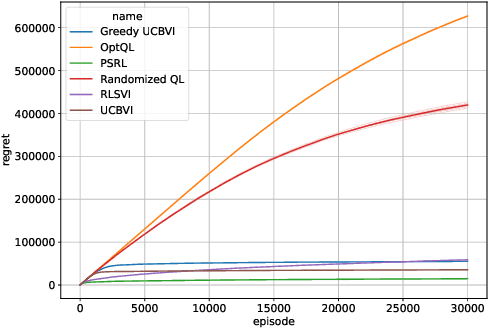
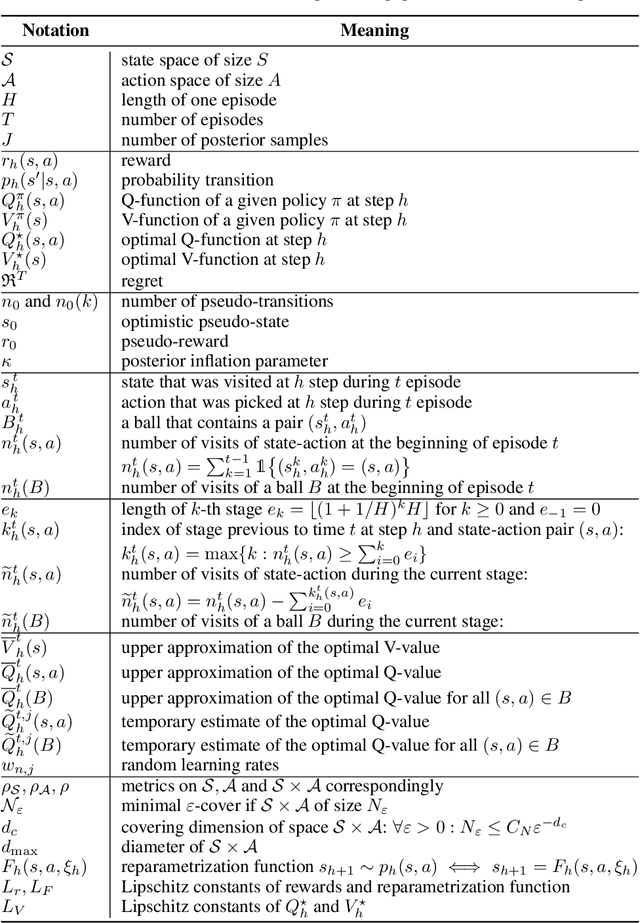
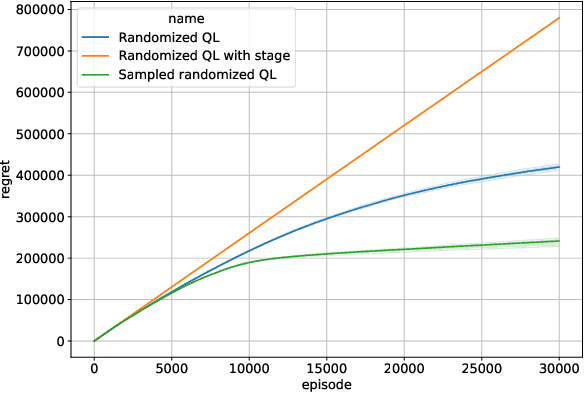

Abstract:In this paper, we introduce Randomized Q-learning (RandQL), a novel randomized model-free algorithm for regret minimization in episodic Markov Decision Processes (MDPs). To the best of our knowledge, RandQL is the first tractable model-free posterior sampling-based algorithm. We analyze the performance of RandQL in both tabular and non-tabular metric space settings. In tabular MDPs, RandQL achieves a regret bound of order $\widetilde{\mathcal{O}}(\sqrt{H^{5}SAT})$, where $H$ is the planning horizon, $S$ is the number of states, $A$ is the number of actions, and $T$ is the number of episodes. For a metric state-action space, RandQL enjoys a regret bound of order $\widetilde{\mathcal{O}}(H^{5/2} T^{(d_z+1)/(d_z+2)})$, where $d_z$ denotes the zooming dimension. Notably, RandQL achieves optimistic exploration without using bonuses, relying instead on a novel idea of learning rate randomization. Our empirical study shows that RandQL outperforms existing approaches on baseline exploration environments.
Demonstration-Regularized RL
Oct 26, 2023
Abstract:Incorporating expert demonstrations has empirically helped to improve the sample efficiency of reinforcement learning (RL). This paper quantifies theoretically to what extent this extra information reduces RL's sample complexity. In particular, we study the demonstration-regularized reinforcement learning that leverages the expert demonstrations by KL-regularization for a policy learned by behavior cloning. Our findings reveal that using $N^{\mathrm{E}}$ expert demonstrations enables the identification of an optimal policy at a sample complexity of order $\widetilde{\mathcal{O}}(\mathrm{Poly}(S,A,H)/(\varepsilon^2 N^{\mathrm{E}}))$ in finite and $\widetilde{\mathcal{O}}(\mathrm{Poly}(d,H)/(\varepsilon^2 N^{\mathrm{E}}))$ in linear Markov decision processes, where $\varepsilon$ is the target precision, $H$ the horizon, $A$ the number of action, $S$ the number of states in the finite case and $d$ the dimension of the feature space in the linear case. As a by-product, we provide tight convergence guarantees for the behaviour cloning procedure under general assumptions on the policy classes. Additionally, we establish that demonstration-regularized methods are provably efficient for reinforcement learning from human feedback (RLHF). In this respect, we provide theoretical evidence showing the benefits of KL-regularization for RLHF in tabular and linear MDPs. Interestingly, we avoid pessimism injection by employing computationally feasible regularization to handle reward estimation uncertainty, thus setting our approach apart from the prior works.
Sharp Deviations Bounds for Dirichlet Weighted Sums with Application to analysis of Bayesian algorithms
Apr 06, 2023Abstract:In this work, we derive sharp non-asymptotic deviation bounds for weighted sums of Dirichlet random variables. These bounds are based on a novel integral representation of the density of a weighted Dirichlet sum. This representation allows us to obtain a Gaussian-like approximation for the sum distribution using geometry and complex analysis methods. Our results generalize similar bounds for the Beta distribution obtained in the seminal paper Alfers and Dinges [1984]. Additionally, our results can be considered a sharp non-asymptotic version of the inverse of Sanov's theorem studied by Ganesh and O'Connell [1999] in the Bayesian setting. Based on these results, we derive new deviation bounds for the Dirichlet process posterior means with application to Bayesian bootstrap. Finally, we apply our estimates to the analysis of the Multinomial Thompson Sampling (TS) algorithm in multi-armed bandits and significantly sharpen the existing regret bounds by making them independent of the size of the arms distribution support.
Fast Rates for Maximum Entropy Exploration
Mar 14, 2023



Abstract:We consider the reinforcement learning (RL) setting, in which the agent has to act in unknown environment driven by a Markov Decision Process (MDP) with sparse or even reward free signals. In this situation, exploration becomes the main challenge. In this work, we study the maximum entropy exploration problem of two different types. The first type is visitation entropy maximization that was previously considered by Hazan et al. (2019) in the discounted setting. For this type of exploration, we propose an algorithm based on a game theoretic representation that has $\widetilde{\mathcal{O}}(H^3 S^2 A / \varepsilon^2)$ sample complexity thus improving the $\varepsilon$-dependence of Hazan et al. (2019), where $S$ is a number of states, $A$ is a number of actions, $H$ is an episode length, and $\varepsilon$ is a desired accuracy. The second type of entropy we study is the trajectory entropy. This objective function is closely related to the entropy-regularized MDPs, and we propose a simple modification of the UCBVI algorithm that has a sample complexity of order $\widetilde{\mathcal{O}}(1/\varepsilon)$ ignoring dependence in $S, A, H$. Interestingly enough, it is the first theoretical result in RL literature establishing that the exploration problem for the regularized MDPs can be statistically strictly easier (in terms of sample complexity) than for the ordinary MDPs.
Optimistic Posterior Sampling for Reinforcement Learning with Few Samples and Tight Guarantees
Sep 28, 2022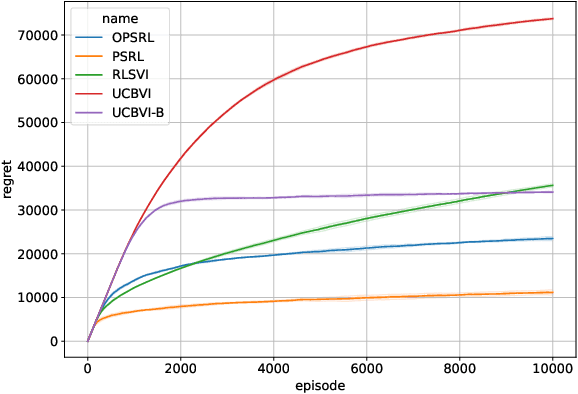
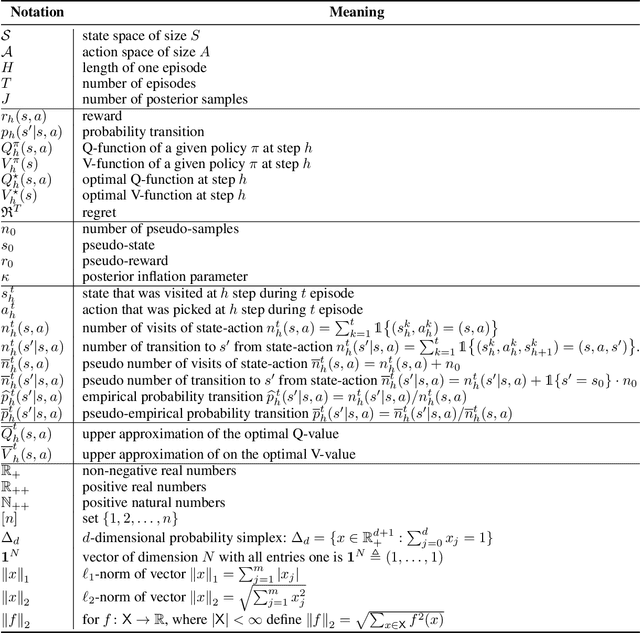
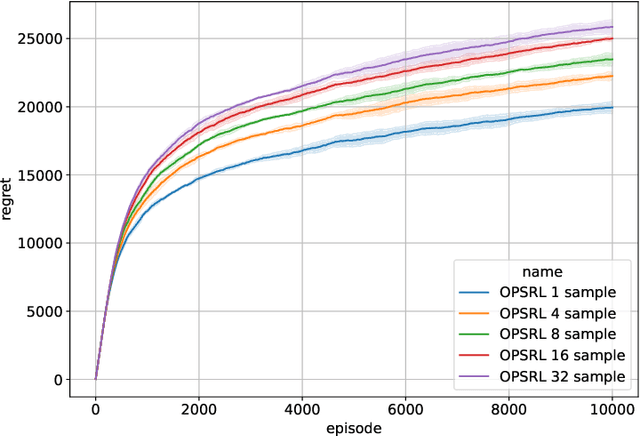
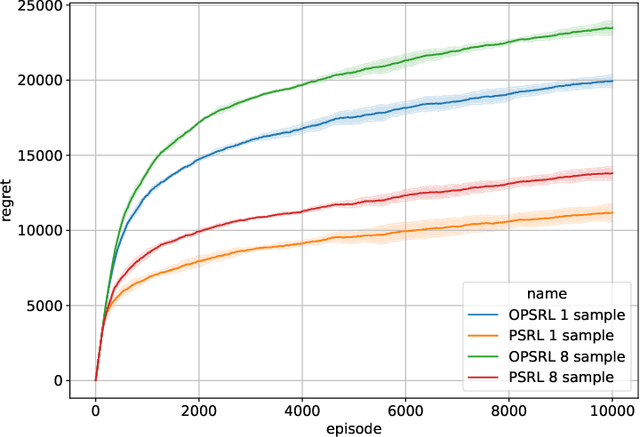
Abstract:We consider reinforcement learning in an environment modeled by an episodic, finite, stage-dependent Markov decision process of horizon $H$ with $S$ states, and $A$ actions. The performance of an agent is measured by the regret after interacting with the environment for $T$ episodes. We propose an optimistic posterior sampling algorithm for reinforcement learning (OPSRL), a simple variant of posterior sampling that only needs a number of posterior samples logarithmic in $H$, $S$, $A$, and $T$ per state-action pair. For OPSRL we guarantee a high-probability regret bound of order at most $\widetilde{\mathcal{O}}(\sqrt{H^3SAT})$ ignoring $\text{poly}\log(HSAT)$ terms. The key novel technical ingredient is a new sharp anti-concentration inequality for linear forms which may be of independent interest. Specifically, we extend the normal approximation-based lower bound for Beta distributions by Alfers and Dinges [1984] to Dirichlet distributions. Our bound matches the lower bound of order $\Omega(\sqrt{H^3SAT})$, thereby answering the open problems raised by Agrawal and Jia [2017b] for the episodic setting.
From Dirichlet to Rubin: Optimistic Exploration in RL without Bonuses
May 16, 2022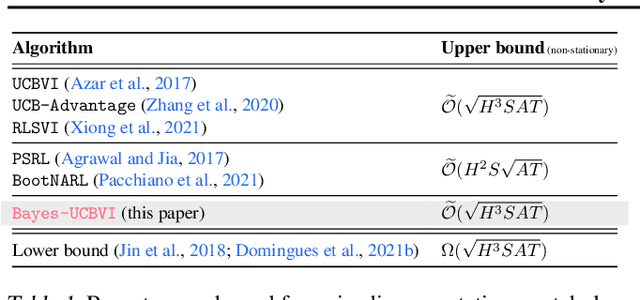
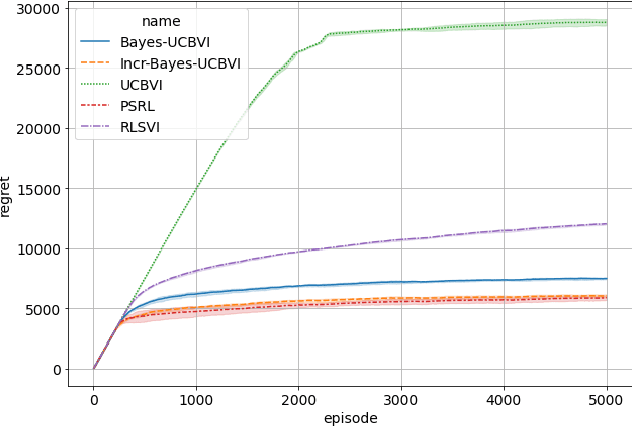
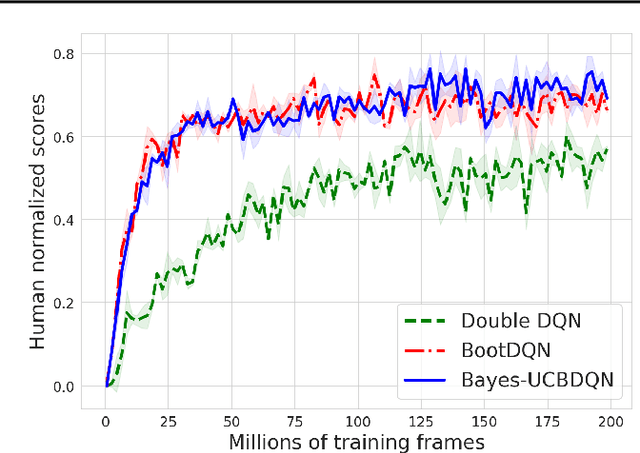
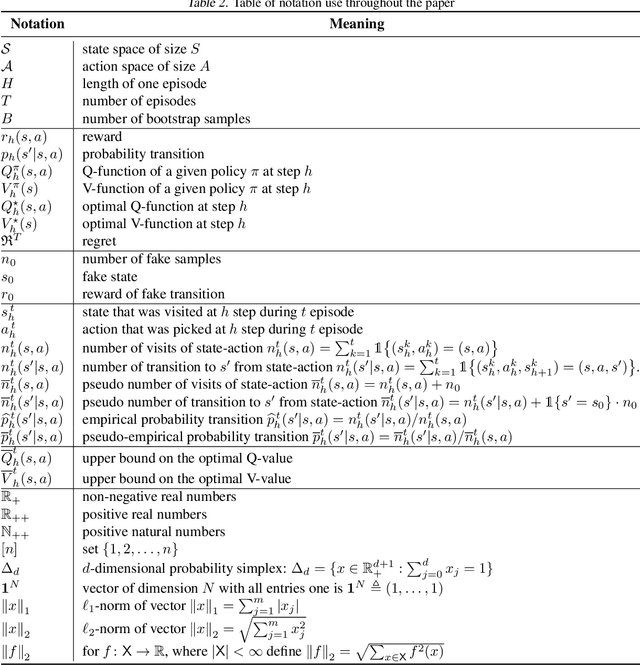
Abstract:We propose the Bayes-UCBVI algorithm for reinforcement learning in tabular, stage-dependent, episodic Markov decision process: a natural extension of the Bayes-UCB algorithm by Kaufmann et al. (2012) for multi-armed bandits. Our method uses the quantile of a Q-value function posterior as upper confidence bound on the optimal Q-value function. For Bayes-UCBVI, we prove a regret bound of order $\widetilde{O}(\sqrt{H^3SAT})$ where $H$ is the length of one episode, $S$ is the number of states, $A$ the number of actions, $T$ the number of episodes, that matches the lower-bound of $\Omega(\sqrt{H^3SAT})$ up to poly-$\log$ terms in $H,S,A,T$ for a large enough $T$. To the best of our knowledge, this is the first algorithm that obtains an optimal dependence on the horizon $H$ (and $S$) without the need for an involved Bernstein-like bonus or noise. Crucial to our analysis is a new fine-grained anti-concentration bound for a weighted Dirichlet sum that can be of independent interest. We then explain how Bayes-UCBVI can be easily extended beyond the tabular setting, exhibiting a strong link between our algorithm and Bayesian bootstrap (Rubin, 1981).
UCB Momentum Q-learning: Correcting the bias without forgetting
Mar 01, 2021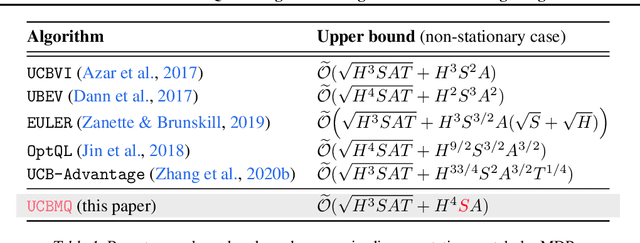
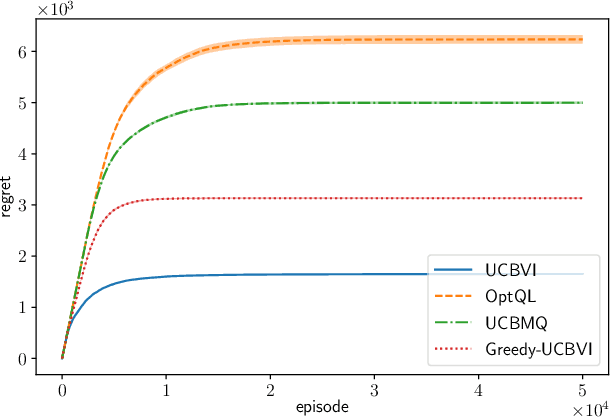
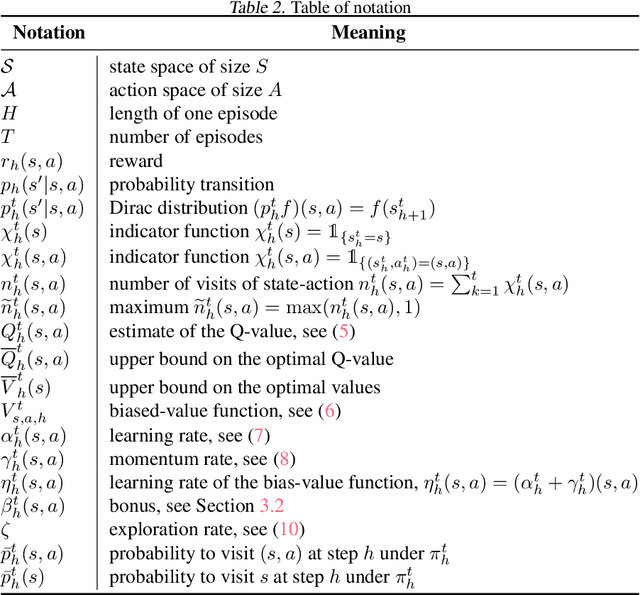
Abstract:We propose UCBMQ, Upper Confidence Bound Momentum Q-learning, a new algorithm for reinforcement learning in tabular and possibly stage-dependent, episodic Markov decision process. UCBMQ is based on Q-learning where we add a momentum term and rely on the principle of optimism in face of uncertainty to deal with exploration. Our new technical ingredient of UCBMQ is the use of momentum to correct the bias that Q-learning suffers while, at the same time, limiting the impact it has on the second-order term of the regret. For UCBMQ , we are able to guarantee a regret of at most $O(\sqrt{H^3SAT}+ H^4 S A )$ where $H$ is the length of an episode, $S$ the number of states, $A$ the number of actions, $T$ the number of episodes and ignoring terms in poly$log(SAHT)$. Notably, UCBMQ is the first algorithm that simultaneously matches the lower bound of $\Omega(\sqrt{H^3SAT})$ for large enough $T$ and has a second-order term (with respect to the horizon $T$) that scales only linearly with the number of states $S$.
The Influence of Shape Constraints on the Thresholding Bandit Problem
Jun 17, 2020


Abstract:We investigate the stochastic Thresholding Bandit problem (TBP) under several shape constraints. On top of (i) the vanilla, unstructured TBP, we consider the case where (ii) the sequence of arm's means $(\mu_k)_k$ is monotonically increasing MTBP, (iii) the case where $(\mu_k)_k$ is unimodal UTBP and (iv) the case where $(\mu_k)_k$ is concave CTBP. In the TBP problem the aim is to output, at the end of the sequential game, the set of arms whose means are above a given threshold. The regret is the highest gap between a misclassified arm and the threshold. In the fixed budget setting, we provide problem independent minimax rates for the expected regret in all settings, as well as associated algorithms. We prove that the minimax rates for the regret are (i) $\sqrt{\log(K)K/T}$ for TBP, (ii) $\sqrt{\log(K)/T}$ for MTBP, (iii) $\sqrt{K/T}$ for UTBP and (iv) $\sqrt{\log\log K/T}$ for CTBP, where $K$ is the number of arms and $T$ is the budget. These rates demonstrate that the dependence on $K$ of the minimax regret varies significantly depending on the shape constraint. This highlights the fact that the shape constraints modify fundamentally the nature of the TBP.
Thresholding Bandit for Dose-ranging: The Impact of Monotonicity
Jul 24, 2018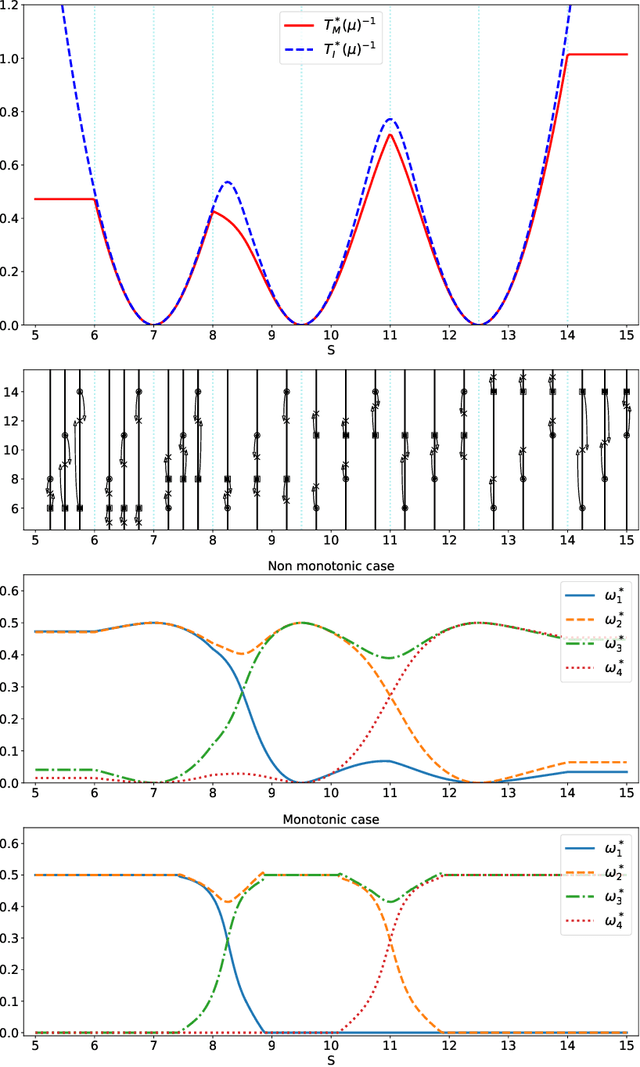


Abstract:We analyze the sample complexity of the thresholding bandit problem, with and without the assumption that the mean values of the arms are increasing. In each case, we provide a lower bound valid for any risk $\delta$ and any $\delta$-correct algorithm; in addition, we propose an algorithm whose sample complexity is of the same order of magnitude for small risks. This work is motivated by phase 1 clinical trials, a practically important setting where the arm means are increasing by nature, and where no satisfactory solution is available so far.
 Add to Chrome
Add to Chrome Add to Firefox
Add to Firefox Add to Edge
Add to Edge